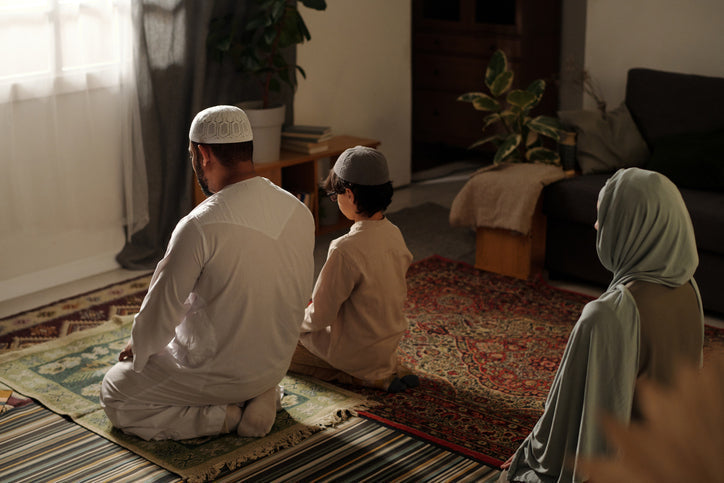Allahumma Ajurni Fi Musibati Wa Akhlif Li Khairan Minha: A Dua for Trials and Divine Hope
Key Takeaways
- Trust in Divine Wisdom: This dua teaches us to accept that every trial comes with Allah's wisdom and the promise of eventual reward and replacement with something better than we lost.
- Patience Through Hardship: By reciting this supplication, Muslims cultivate sabr (patience) and maintain hope during life's most challenging moments, knowing Allah sees their struggle and will compensate them.
- Transformation of Loss: The dua transforms our perspective on calamities from pure loss to opportunities for spiritual growth and divine compensation beyond our imagination.
Meaning and Breakdown of the Dua
The supplication "Allahumma ajurni fi musibati wa akhlif li khairan minha" translates to:
"O Allah, reward me in my affliction and replace it with something better."
Detailed Breakdown:
- Allahumma: "O Allah" (calling upon Allah with reverence)
- Ajurni fi musibati: "Reward me in my affliction/trial/hardship" (seeking spiritual reward for enduring pain)
- Wa akhlif li khairan minha: "And replace it with something better than it" (trusting Allah's ability to provide superior compensation)
Context and Prophetic Foundation
This supplication is deeply rooted in the teachings of Prophet Muhammad ﷺ and reflects complete trust in Allah's wisdom and mercy. The dua acknowledges that while we experience genuine pain during trials, Allah's plan includes both immediate spiritual rewards for our patience and future blessings that surpass what we have lost.
Authentic Hadith Reference: Umm Salamah (may Allah be pleased with her) narrated: Prophet Muhammad ﷺ said:
"Whenever a Muslim suffers from a calamity and says: 'Allahumma ajurni fi musibati wa akhlif li khairan minha,' Allah will compensate them with something better." (Sahih Muslim, Book 4, Hadith 2001)
This hadith provides the divine guarantee that sincere recitation of this dua during trials will result in Allah's superior compensation, whether in this life or the next.
Spiritual Lessons and Transformative Power
Patience in Adversity (Sabr)
This dua teaches us to remain patient and hopeful during trials, understanding that every hardship carries within it an opportunity for spiritual growth and divine reward. Rather than simply enduring pain, we actively seek Allah's blessings through our suffering, transforming our relationship with difficulty.
Trust in Allah's Perfect Plan (Tawakkul)
By asking Allah for something better, you acknowledge His infinite wisdom and ability to provide beyond your imagination. This supplication transforms our relationship with difficulty from resistance to acceptance and hope, recognizing that Allah's knowledge encompasses what we cannot see.
Hope and Optimism During Dark Times
Reciting this dua instills confidence that Allah's blessings and relief will follow even the most challenging periods. It reminds us that current pain is temporary, while Allah's mercy is eternal and His rewards are beyond human comprehension.
Surrender and Divine Compensation
Through these words, the believer surrenders the pain to Allah while maintaining hope for divine compensation. This surrender is not passive resignation but active trust in Allah's promise to replace our losses with something superior.
When and How to Recite This Dua
Immediate Application:
- Upon experiencing any loss or calamity, whether major or minor
- During moments of emotional overwhelm or despair
- When facing unexpected setbacks or disappointments
- While seeking comfort and divine assistance during prolonged difficulties
Recommended Practice: Recite this dua immediately when facing any trial, then repeat it regularly throughout the difficult period. Many scholars recommend saying it three times with sincere intention and complete trust in Allah's response. The key is genuine belief in Allah's promise rather than mere repetition.
Timing Considerations:
- Best recited immediately after recognizing a trial or loss
- During quiet moments of reflection and prayer
- As part of daily supplications for ongoing spiritual strength
- When teaching family members about resilience through faith
Practical Applications for Daily Life
For Working Professionals When facing job loss, workplace conflicts, or career setbacks, recite this dua during your morning commute or quiet moments at work. Keep a small card with the Arabic and translation in your wallet as a reminder that professional challenges can lead to better opportunities through Allah's wisdom. Use brief moments between meetings to reconnect with this hope-filled supplication.
For Parents Managing Multiple Responsibilities During family crises, health scares, financial stress, or overwhelming parenting moments, teach your children this dua and explain how difficult times can bring families closer to Allah. Create a family tradition of saying this together during challenging periods, helping children understand that trials are tests that lead to growth and unexpected blessings.
For Students and Lifelong Learners When facing academic disappointments, exam failures, or educational obstacles, use this dua to maintain perspective. Understand that academic setbacks often redirect us toward paths that better suit our talents and Allah's plan for our lives. Recite it during study breaks to reset your intention and find peace in Allah's greater plan.
For Those Experiencing Health Challenges During illness, medical treatments, or chronic conditions, recite this dua to find peace in knowing that health trials can purify sins, increase spiritual strength, and lead to greater appreciation for wellness when it returns. Use it as a source of comfort during medical appointments or difficult treatment periods.
For Those Facing Financial Difficulties When experiencing job loss, business setbacks, or financial strain, this dua helps reframe hardship as a path to Allah's reward and mercy. Trust that Allah may be redirecting you toward more blessed income sources or teaching valuable lessons about reliance on Him rather than worldly security.
Understanding Divine Compensation
Forms of "Something Better": Allah's replacement may manifest in numerous ways that surpass our limited expectations:
- Spiritual Growth: Increased closeness to Allah, stronger faith, and deeper understanding of Islamic principles
- Character Development: Enhanced patience, empathy, resilience, and wisdom gained through experience
- Unexpected Opportunities: New career paths, relationships, or life directions we couldn't have imagined
- Purification: Cleansing of sins and elevation of spiritual status through patient endurance
- Future Blessings: Rewards in this life or the next that far exceed what was lost
Timing of Divine Wisdom: Sometimes the "something better" comes immediately, other times it unfolds over months or years. The believer trusts that Allah's timing is perfect, even when we cannot see the wisdom in the present moment. The compensation may be spiritual rather than material, eternal rather than temporary.
Frequently Asked Questions
Q: What makes this dua so powerful during times of hardship and loss?
A: This dua combines three essential elements: seeking spiritual reward for current suffering, trusting Allah's wisdom in allowing the trial, and expressing unwavering faith that He will provide something superior. This complete surrender to Allah's plan transforms our experience of hardship from despair to hope and active trust.
Q: Can this dua be recited for any type of calamity, or are there specific situations where it applies?
A: This dua applies universally to any form of trial, whether physical, emotional, financial, spiritual, or social. The Prophet ﷺ taught it as a comprehensive supplication for all types of calamities, from minor daily disappointments to major life crises, including death of loved ones, health issues, and financial losses.
Q: How does Allah replace our losses with something better, and what does "better" actually mean?
A: Allah's replacement often comes in forms we didn't expect: spiritual growth, stronger faith, new opportunities, character development, or future blessings that exceed what was lost. "Better" is defined by Allah's infinite wisdom, not our limited perspective, and may include spiritual rewards that surpass any worldly compensation.
Q: Should children learn this dua, and how can parents teach it effectively to build resilience?
A: Absolutely. Teaching children this dua helps them develop Islamic resilience and trust in Allah from an early age. Parents can share age-appropriate examples of how losses led to unexpected blessings, encourage children to say this dua during their own small difficulties, and model faith-based responses to family challenges.
Q: What is the significance of asking for both reward AND replacement in this single supplication?
A: The dual request acknowledges that trials serve multiple divine purposes: immediate spiritual purification and reward for patient endurance, plus future worldly or spiritual blessings that exceed what was lost. This comprehensive approach reflects the depth of Allah's mercy and the multifaceted wisdom behind every test He allows.
This article was written by Sheela M. Ahmed, founder and owner of AlHiqma, blending traditional Islamic teachings with contemporary Muslim experiences. Since establishing AlHiqma in 2018, she has been dedicated to helping Muslim families strengthen their connection to faith through authentic Islamic lifestyle education grounded in values from the Quran and real-life applications.
We want to hear from you! How has this dua helped you through difficult times? What family traditions do you have for supporting each other during trials? Have you experienced Allah's promise of "something better" after reciting this supplication? Share your experiences of finding unexpected blessings after hardship with our AlHiqma community through our social media platforms. Your stories inspire and encourage fellow Muslims on their spiritual journeys—let's grow together in faith!












